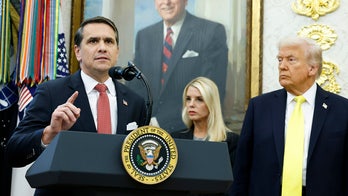President Biden on Monday warned that climate is "an existential threat to human existence as we know it," at the United Nations' COP26 conference, then apologized for former President Trump's withdrawal from the Paris climate accord.
Speaking from Glasgow, Scotland, Biden called for a "decade of transformative action" to "preserve" the planet, saying that "the science is clear."
"We only have a brief window left before us to raise our ambitions to meet the task that’s rapidly narrowing ourselves," the president said.
"I believe there’s an incredible opportunity — not just for the United States — but for all of us. We are standing at an inflection point in history," he continued. "We have the ability to invest in ourselves and build an equitable, clean energy future, and, in the process, create millions of good paying jobs and opportunities around the world; cleaner air for our children; bountiful oceans; healthier forests; and ecosystems for our planet."
Biden warned that the climate crisis is "a challenge of our collective lifetimes."
"The existential threat to human existence as we know it," Biden said. "And every day we delay, the cost of inaction increases."
He added: "Let this be a decade of transformative action that preserves our planet and raises the quality of life for people everywhere. We can do this. We just have to make a choice to do it."
Biden said that his administration is "working overtime" to show that its climate commitment is "action, not words."
Following the scheduled remarks, Biden said on behalf of the U.S. that he was sorry for Trump pulling out of the Paris accord, an Obama-era international agreement to take measures to get rising global temperatures under control. The former president announced the move in 2017, but it did not formally take effect until November 2020.
"I do apologize," Biden said, according to The Associated Press, adding that the U.S. "will do our part" to lower emissions. Under the Biden administration, the U.S. formally rejoined the Paris climate agreement in February following Biden’s day-one executive order.
Trump's reasons for leaving the Paris accord included a fear of American job losses and a concern that it would force the U.S. to spend a disproportionate amount of money compared to other countries.
During the speech, Biden plugged his "Build Back Better" economic agenda, saying it will make "historic investments in clean energy," calling it the "most significant investment to deal with the climate crisis than any advanced nation has ever made."
The president also committed to cutting U.S. greenhouse gas emissions "by well over a gigaton by 2030," while "making more affordable for consumers to save on their own energy bills with tax credits for things like installing solar panels, weatherizing their homes, lowering energy prices will also deliver cleaner air and water for our children; electrifying fleets of school buses, increasing credits for electric vehicles and addressing legacy pollution."
BIDEN ADMIN STRESSES URGENCY OF CLOSING DEAL ON INFRASTRUCTURE, AS PROGRESSIVES SIGNAL NO RUSH
Biden said it would "incentivize clean energy manufacturing and building solar panels and wind turbines that are growing energy markets of the future," saying they would "create good paying union jobs for American workers."
The president, prior to traveling to Europe for the G20 summit in Rome and to Scotland for the COP26 climate conference, was scrambling to reach a deal, telling congressional Democrats that the next week of consideration would be of crucial importance, and hanging the success of his administration on the matter.
The president’s social spending package, once valued at $3.5 trillion, is now down to a leaner $1.75 trillion after progressives and moderates agreed to cut programs including universal community college and paid family leave. That bill only requires a simple majority to pass in the Senate because it would be done through a process known as budget reconciliation, but moderate Democratic Senators Joe Manchin of West Virginia and Kyrsten Sinema of Arizona have said they still will not support it.
Meanwhile, Biden and members of his administration have declared climate change a national security threat. Over the summer, Biden warned it would be the "greatest threat" to America’s national security in the coming years.
CLICK HERE TO GET THE FOX NEWS APP
Biden last year announced former Secretary of State John Kerry would serve as the special presidential envoy for climate and would sit on the National Security Council – marking it the first administration with the NSC including an official dedicated to climate change.
The Associated Press contributed to this report.















































